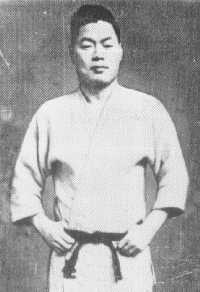by Tony Papenfuss, PhD
(Edited by Neil Ohlenkamp)
Mikonosuke Kawaishi was born in Kyoto in 1899, and he died on January 30, 1969 in Paris. He studied jujitsu at the Dai Nippon Butokukai (Greater Japan Association of Martial Virtue) in Kyoto. It is not known exactly what style of jujitsu he learned, although it seems it was a form of Aiki-jujitsu. A group in England that continues to teach this form refer to their teachings as Kawaishi Ryu Jujitsu. In the mid-1920’s he left Japan and toured the United States, teaching particularly in New York and San Diego. In 1928, he arrived in the United Kingdom and established a jujitsu club in Liverpool, where he taught Aiki-jujitsu. He supplemented his meager income from teaching by wrestling professionally under the name “Matsuda”, taking on wrestlers and boxers in the ring and on stage in music halls. In 1931, he moved to London, founding the Anglo-Japanese Judo Club and teaching Judo at Oxford University. Around this time Kawaishi was awarded his third dan by Jigoro Kano. It was common at this time for jujitsu instructors to teach, or call what they taught, Judo. Moreover, Kano awarded many jujitsu exponents Judo black belts in order to recruit them into the Kodokan. In 1936, then a fourth dan, Kawaishi moved to Paris where he taught jujitsu and Judo. During World War 2, Kawaishi returned to Japan and was imprisoned in Manchuria for a time, but he returned to Paris after the war to continue teaching. Before the war, Kawaishi and his student Moshe Feldenkreis had prepared the photographs for a book on Judo. Feldenkreis had to flee France during this time. Kawaishi later used the photographs in Standing Judo, while Feldenkreis wrote Judo, and Higher Judo. Kawaishi came to believe that merely transplanting the teaching methods of Japan to the West was inappropriate. He developed an intuitive style of instruction and a numerical ordering of the techniques that he felt was more suitable for the West. He adapted his teaching methods to suit the European culture. This became known as the Kawaishi Method. One of the changes he is credited with is the introduction of many colored belts to recognize advancement in Judo. This seemed to catch on in France and there was a rapid growth of interest in Judo. His system of Judo is fully described in his book My Method of Judo written when he was a 7th dan and published in English in 1955. He wrote:
After World War II and through the 1950’s, the Kodokan moved more and more towards the sport of Judo; banning techniques from shiai and dropping them from the Kodokan syllabus. Kawaishi, however, continued to teach many of these techniques. This led to several political splits and critics suggesting he had departed from the spirit of Kodokan Judo. His proponents, on the other hand, say that his teachings remained closer to Kano’s jujitsu. In fact, the strength of his Judo has led some jujitsu historians to believe that he was a Judoka who also taught a system of Goshin-jitsu (self defense). He authored My Method of Self Defense, Standing Judo and several other books. Kawaishi placed special emphasis on kata training. He promulgated Kyuzo Mifune’s Gonosen No Kata (Forms of Counters) in Europe, and possibly his own version of Go No Kata, the forms of hardness. He also wrote the book Seven Katas of Judo. Gonosen No Kata remains comparitively common in Europe, but practically unheard of in the United States as a result of Kawaishi’s (and Gunji Koizumi’s) teachings. Kawaishi is credited with being the person most responsible for the spread of Judo throughout France and much of Europe. His books continue to be popular, and the Kawaishi Method is still practiced around the world today. Kawaishi and Moshe Feldenkrais founded the French Judo Federation and he served as Technical Director for many years. In 1947 he and Koizumi held the first ever international Judo tournament between France and the United Kingdom which became known as the Kawaishi Cup. | ||
| When there is opposition, harmonize with it on the spot. Ki-ichi-Hogen |

